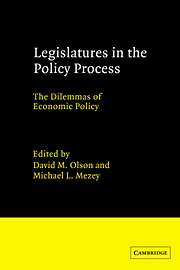Book contents
- Frontmatter
- Contents
- List of contributors
- Preface
- Acknowledgments
- PART I INTRODUCTION
- PART II MACROECONOMIC POLICY
- PART III MICROECONOMIC POLICY
- 5 The British House of Commons and industrial policy
- 6 Congress and the development of a computer industry policy in Brazil
- 7 Electronics policy and the Indian parliament
- 8 The Polish parliament and labor legislation during Solidarity
- PART IV CONCLUSION
- Name index
- General index
7 - Electronics policy and the Indian parliament
Published online by Cambridge University Press: 03 March 2010
- Frontmatter
- Contents
- List of contributors
- Preface
- Acknowledgments
- PART I INTRODUCTION
- PART II MACROECONOMIC POLICY
- PART III MICROECONOMIC POLICY
- 5 The British House of Commons and industrial policy
- 6 Congress and the development of a computer industry policy in Brazil
- 7 Electronics policy and the Indian parliament
- 8 The Polish parliament and labor legislation during Solidarity
- PART IV CONCLUSION
- Name index
- General index
Summary
This chapter examines the actions of the Indian parliament in policy relating to the electronics industry, in order to test some of the hypotheses raised in the opening chapter about the factors affecting legislative involvement in policy processes. India inherited the British parliamentary system upon its early postwar independence. In the world's most populous democracy, the prime minister is selected as the result of parliamentary elections in which the Congress Party usually holds a sizeable majority. As leader of the party of the government, the prime minister effectively controls parliament and manages the cabinet system. Having created the government, parliament reviews, questions, and debates the government and its policies. While parliament could unseat the government, it never has; while parliament could defeat a major government policy, it never has.
This chapter will examine what parliament has done over the years on the development and review of policy towards the electronics industry in India. As a parliamentary system within a Third World but rapidly developing country, India is particularly relevant to several of the hypotheses concerning the sources of parliamentary activity in the policy process. The impact of the parliamentary system itself is evident, as are the combined influences of a single party majority and the British style of nonspecialized parliamentary committees. The Indian experience illustrates how a parliament can be intermittently active on a policy topic, mainly in the implementation rather than policy initiation stages.
This chapter will first review the policy process in India, and then turn to electronics policy.
- Type
- Chapter
- Information
- Legislatures in the Policy ProcessThe Dilemmas of Economic Policy, pp. 160 - 178Publisher: Cambridge University PressPrint publication year: 1991



